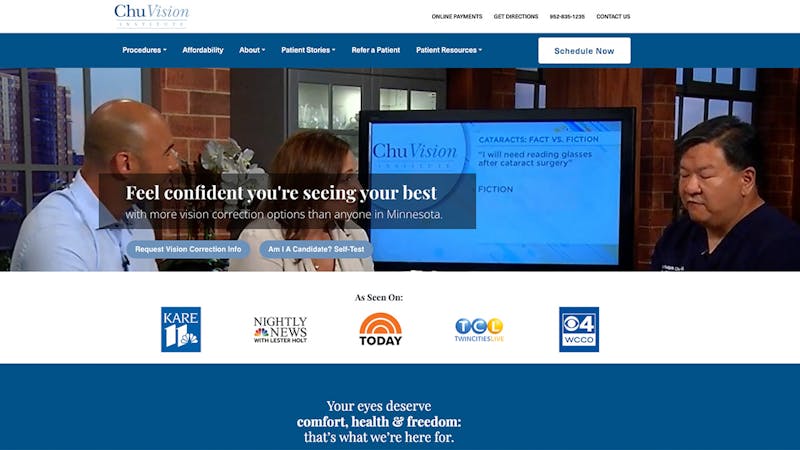
TRANSCRIPTION
Diane: Well, when it comes to smart technology, are too many of us acting dumb? According to a study from The Vision Council, a whopping 30% of adults say they spend more than nine hours a day looking at screens. Dr. Ralph Chu, medical director of Chu Vision Institute joins us now with more on why this is a bad thing for our eye health, plus a great tip on how we can help our eyes. Thank you for joining us.
Dr. Ralph Chu: Thanks for having me, Diane.
Diane: Okay. So number one, right off the bat, we’ve heard in the past, but why is having too much screen time a bad thing for our eyes?
Dr. Ralph Chu: Well, the eyes are like any muscle, if you use it too much, it can get worn out. And so really taking a break from all the screen time. This is one of the most common reasons people come to see us. When they’re looking for LASIK or cataract surgery, they all want to see their computers or read their laptops without glasses and see them more clearly. So taking a break is really the first piece of advice.
Diane: Mm-hmm (affirmative). So if we don’t take a break though, I know even my daughter, who’s 23, she’s starting to notice that she’s getting dry eyes a little bit.
Dr. Ralph Chu: Yeah. There’s more and more information out there about this high energy light waves that come from these white screens that we like so much, that there can be potentially longterm damage to the retina, leading towards a higher risk of macular degeneration. And like your daughter, all of us decrease our blink rate by 50% when we’re reading a screen. So reminding yourself to blink can help relieve some of those symptoms. And the last thing most interestingly is, some of these light wave actually have been shown to disrupt the circadian rhythm. So if we’re looking at iPads before we go to bed, that could disrupt your sleep cycle.
Diane: Which a lot of us are.
Dr. Ralph Chu: Yeah.
Diane: Especially in our business, we’re very tied to all of these things. So when we move on, so what can folks do to prevent the health problems that we are seeing with all of our screen time?
Dr. Ralph Chu: Yeah. I think one of the things we tell our patients is the 20, 20, 20 rule, which simply is every 20 minutes when you’re using your screen, take a break and look at something 20 feet away for 20 seconds. So that’ll help your eyes reset, so to speak. And that will help I think, minimize some of the effects potentially of this prolonged screen time that we’re seeing in society.
Diane: Mm-hmm (affirmative). Now I did that, took that, your advice earlier today. Because again, in our newsroom, we’re connected to our screens as so many businesses are. And so I actually noticed that my eyes were having a little trouble adjusting 20 feet away, took a little bit of time.
Dr. Ralph Chu: That’s very common. And sometimes when you see that, using a screen protector, there are some screen protectors out there. There’s a Minnesota company that makes one of these and it actually helps reduce those harmful rays that are entering your retina. And that may also help reduce some of your symptoms.
Diane: Now, you say that this has a blue screen? I know that we can take down the intensity of the screens that we’re working with. That was one of your recommendations, but then this is actually a product you would put on top of your iPhone, or one of your phones, and it’s a blue screen basically.
Dr. Ralph Chu: Exactly. This is a filter that is actually designed to reduce the harmful rays. And they have actually a retinol protection factor that the degree to which it limits those rays from leaving the screen. So it’s not just reducing the intensity, but actually makes the light from the screen more like natural light. So a little more healthy for your eye.
Diane: All right. Thank you so much for joining us today. We really appreciate all of these great tips.
Dr. Ralph Chu: Thank you for having me.
Diane: And then again, for more on what we just talked about, head to kare11.com, click on the 4:00 PM news.
